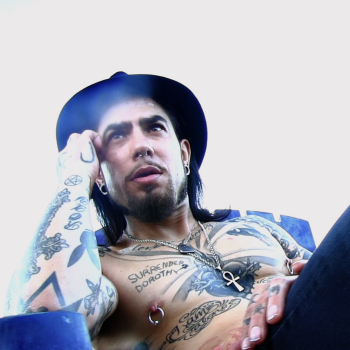Back in the late ’80s and ’90s, the L.A. band Jane’s Addiction became one of the defining rock bands of the era, racking up five Grammy nominations and launching the Lollapalooza rock festival. With their blend of progressive metal and psychedelia, they still sell out tours whenever they emerge from periodic hiatuses.
Dave Navarro is the band’s lead guitarist. He’s also played with the Red Hot Chili Peppers, hosts the hit tattoo competition TV show “Ink Master,” and hosts the radio show and podcast “Dark Matter“… which is an apt description of his latest project: the documentary “Mourning Son.” Directed by Todd Newman, it’s about Dave coming to terms with the death of his mother, who was murdered by her ex-boyfriend when he was 15 years old.
The film is out now on iTunes and it also screens Sunday, March 6th, in L.A. at The Downtown Independent Cinema at 8 p.m. Navarro will be doing a Q&A after the screening.
When Rico spoke with the musician this week, he first asked why Dave made a film about the murder… knowing that, during editing, he’d have to repeatedly revisit a subject he’d previously not talked much about publicly.

Dave Navarro: It sounds… you would think that. But let’s be clear, I hadn’t avoided telling it. And believe me, there were years and years of therapy prior to all this. I don’t recommend — if you have some traumatic event — to just dive headfirst into filmmaking! You know what I mean? Like, there’s a lot of work that goes up to it!
But to be perfectly honest, I mean… I don’t know if it was a defense mechanism or just the process, but being a filmmaker allowed me to step back from it in the editing process and watch it as a creative project, as a film, and watch it as a third party, so to speak.
Rico Gagliano: In a sense, did it get easier the more you saw it?
Dave Navarro: You know… the human condition is different on every single day. So one day, it’s super easy. And I’m like, “This is great and this is really interesting. And it’s inspired, and I’m super energetic about some creative decision we’re making.” And then, two weeks later, I have more of a hard time watching some stuff.
Rico Gagliano: If you don’t mind, can I talk about the–
Dave Navarro: Anything you like.
Rico Gagliano:Â — the tragedy that lies at the heart of this film. Your mother, former model, a beautiful woman inside and out it seems, center of her community in a lot of ways, the center of the neighborhood. Everybody loved her…
Dave Navarro: Absolutely, absolutely.
Rico Gagliano: …And what’s crazy to me is that everybody in the neighborhood seemed to know that her ex-boyfriend was stalking her and had threatened her. And yet, somehow, this act couldn’t be stopped. What does that do to you in terms of the way you relate to safety, your concept of safety in the world?
Dave Navarro: You know, I think that the organ between my ears is much more damaging to myself than anything in the real world. You know? I think up scarier things than are actually presented to me.
And you have to understand, 1983 was when this happened. There wasn’t visibility about domestic abuse. You know, we didn’t have the verbiage, and we didn’t have the knowledge and the information about it. Especially in that little community, we didn’t really even know that that was a reality, you know? I mean…
Rico Gagliano: That it could be possible.
Dave Navarro:Â …Yeah. At 15 years old, the furthest thing from my mind was that this could potentially end in a terrible tragedy.
Rico Gagliano: Right. So, you’re dealing with that. And you’re dealing with the fact that, for many years, your mother’s killer was still on the loose… while the band that you were in — Jane’s Addiction — actually started blowing up and becoming incredibly popular. And it’s a fascinating part of the movie where this time in your life that should be amazing, you’re actually frightened and unhappy and descending into heroin addiction.
Dave Navarro: Yes. Like, the last time I was Downtown [ed. note: we taped this interview in downtown L.A.] for any period of time was right over here on Skid Row, when we used to buy syringes from the vets.
That’s where the vets used to go hang out, and they would get insulin needles. Because back in the ’80s and ’90s, you couldn’t just go into a drugstore or go to a needle exchange. There wasn’t anything like that.
So we would have to buy needles — insulin needles — off the vets for $2 bucks a pop. So, I’d go from playing The Forum, which is a big venue here, and getting in my car and going to Skid Row to buy a $2 syringe off the street. Like, there was no glamour to any of it.
Rico Gagliano: But simultaneously… Jane’s Addiction’s music is not inherently super dark. I’m thinking of songs like “Summertime Rolls.” There was an almost hippie aspect to your music.
Dave Navarro: There was the hippie aspect to the music, and there were songs like “Idiots Rule” and “Been Caught Stealing,” which were funny! Like, straight up funny.
Rico Gagliano: Exactly. But could you relate to those songs during this dark period where you’re, you know, in fear of this killer on the loose, and you’re wrestling with addiction?
Dave Navarro: Yeah, but I mean, even when you’re shooting dope… not every day is bad. Let’s be honest about this, you know what I mean? You don’t keep doing it if it’s awful all the time.
So, there are times that are fun. There are times when you feel love. There are times when you’re having a great time and laughing.
Rico Gagliano: Was there a song that you would play that seemed especially cathartic at that time?
Dave Navarro: I always had an affinity for “Then She Did.” That had everything to it that I loved about music, which was space, and lyrical depth, musicality, a little bit of prog, a little bit of goth…
Rico Gagliano: When you played that, could you forget what was going on? Was it actually escapism?
Dave Navarro: Well, the whole… all the time, the shows were. Yes, this killer was on the run for all these years, these early years of Jane’s Addiction. But I think one of the things that saved my life — ironically, at a time when I was also arguably trying to kill it — were the shows, and was the music, and was the band, and having direction.
And one thing I do want to make clear: that I don’t blame the murderer for my drug addiction. There are millions and millions of people who go through trauma, and lose loved ones, and have deaths in their family that don’t become junkies. Do you know what I mean?
Rico Gagliano: It’s true, although you do– I mean, literally, the night that your mother was killed is the night that you say you first took drugs and realized they had a great numbing effect.
Dave Navarro: Oh, yeah. Prior to that, I had only smoked weed or had drinks with my friends and it was a laugh. That was the first time I smoked and realized, “I don’t feel so bad right now. And I feel guilty for not feeling so bad right now, but… I can deal with it.” [laughs]Â You know what I mean? Like, “I don’t feel that guilty!”
Rico Gagliano: Actually, speaking of guilt, something you admit to in the film is that, you know, you were a teenager when this happened. And in a very teenager-y way, you actually used this event as an excuse to get out of anything.
Dave Navarro: Oh, yeah. Yeah, getting out of school, or not doing homework, or coming home late, or whatever kind of trouble I would be in. I could point to that event and say, “Well, what do you expect? I just went through this terrible tragedy.” And people would kind of back off, you know? And you just kind of learned that art of manipulation a little bit.
There were a lot of things that I put in the film and left in the film because I know, as a trauma survivor, people feel shame on top of their trauma.
Rico Gagliano: Meaning?
Dave Navarro: Meaning if I survive this trauma — my mom’s death — and then use that death to get out of school… knowing I was that manipulative about it. That’s the kind of shame that I’m trying to shed light on and say, “Look, people do this, you know? And that’s just sometimes where the brain naturally wants to go.” But it’s like, “It’s OK.” You know, it’s OK to have that awareness. Having the awareness and learning from it allows you to not repeat that behavior.
Rico Gagliano: Do you speak to or work with people who are victims of crime? I know that you’re shown — in the film, you’re shown taping PSAs or…
Dave Navarro: I have. I have, and that’s something I want to do more of.
Rico Gagliano: What do you tell them?
Dave Navarro: One of the things that I have always made pretty clear is that there’s this mythical word that gets floated around this community, which is “closure.” And my experience is that there really isn’t closure. That there’s never a day where it’s all good. Where it’s like, “A nice little ribbon is on the situation, and you can put it away and never think about it. It’s closed.” No; this thing is going to be open forever and ever.
What does happen is it gets easier to live with. What does happen is you can help others by sharing your story. Sometimes just letting someone know that they’re not alone is helpful for them. And being of service to somebody else is cathartic for yourself, and I find that there’s more… I guess, more examples of feeling closure, in those times when I’m being there for someone else.
Rico Gagliano: The film ends with a song by Elliot Smith. Who’s another musician and addict, but who gave into the darkness and at least apparently committed suicide. Why choose that song to end with?
Dave Navarro: I… that’s an interesting question. He’s one of my favorite artists of all time. Certainly identify with his addiction. Certainly identify with his tragic nature and darkness.
The song that we chose, “Fond Farewell,” has a juxtaposed emotion to it. It’s super sad, and it’s super celebratory. And I think that kind of spoke to the nature of the film, because, in another light, I was celebrating my mom’s life.

IT’S A PARTY IN YOUR INBOX…
…when you subscribe to our weekly newsletter. You’ll find all sorts of good stuff there like bonus audio, musings on culture from our staff, photos of our guests and co-hosts being ridiculous, and new cocktail recipes. Sign up below!


